Refine search
Actions for selected content:
23990 results in Ancient history
1 - Herodotus and an Egyptian mirage
-
- Book:
- Egypt and the Limits of Hellenism
- Published online:
- 05 July 2011
- Print publication:
- 07 July 2011, pp 42-83
-
- Chapter
- Export citation
3 - The Delian Sarapis aretalogy and the politics of syncretism
-
- Book:
- Egypt and the Limits of Hellenism
- Published online:
- 05 July 2011
- Print publication:
- 07 July 2011, pp 142-207
-
- Chapter
- Export citation
Epilogue
-
- Book:
- Egypt and the Limits of Hellenism
- Published online:
- 05 July 2011
- Print publication:
- 07 July 2011, pp 274-281
-
- Chapter
- Export citation
Appendix III - Dating the composition of Thessalos, De virtutibus herbarum
-
- Book:
- Egypt and the Limits of Hellenism
- Published online:
- 05 July 2011
- Print publication:
- 07 July 2011, pp 293-297
-
- Chapter
- Export citation
Introduction: the absence of Egypt
-
- Book:
- Egypt and the Limits of Hellenism
- Published online:
- 05 July 2011
- Print publication:
- 07 July 2011, pp 1-41
-
- Chapter
- Export citation
Appendix I - Text and translation of the Delian Sarapis aretalogy (IG XI. 1299)
-
- Book:
- Egypt and the Limits of Hellenism
- Published online:
- 05 July 2011
- Print publication:
- 07 July 2011, pp 282-286
-
- Chapter
- Export citation
Appendix II - Translation of the Madrid manuscript of Thessalos, De virtutibus herbarum (Codex Matritensis Bibl. Nat. 4631)
-
- Book:
- Egypt and the Limits of Hellenism
- Published online:
- 05 July 2011
- Print publication:
- 07 July 2011, pp 287-292
-
- Chapter
- Export citation
Index
-
- Book:
- Egypt and the Limits of Hellenism
- Published online:
- 05 July 2011
- Print publication:
- 07 July 2011, pp 340-347
-
- Chapter
- Export citation
Frontmatter
-
- Book:
- Egypt and the Limits of Hellenism
- Published online:
- 05 July 2011
- Print publication:
- 07 July 2011, pp i-iv
-
- Chapter
- Export citation
Acknowledgments
-
- Book:
- Egypt and the Limits of Hellenism
- Published online:
- 05 July 2011
- Print publication:
- 07 July 2011, pp viii-x
-
- Chapter
- Export citation
Contents
-
- Book:
- Egypt and the Limits of Hellenism
- Published online:
- 05 July 2011
- Print publication:
- 07 July 2011, pp v-vi
-
- Chapter
- Export citation
List of figures and table
-
- Book:
- Egypt and the Limits of Hellenism
- Published online:
- 05 July 2011
- Print publication:
- 07 July 2011, pp vii-vii
-
- Chapter
- Export citation
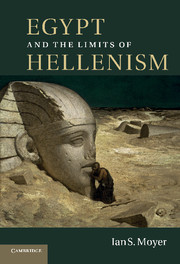
Egypt and the Limits of Hellenism
-
- Published online:
- 05 July 2011
- Print publication:
- 07 July 2011
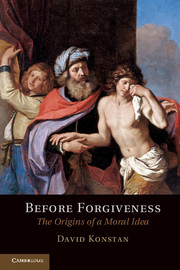
Before Forgiveness
- The Origins of a Moral Idea
-
- Published online:
- 05 July 2011
- Print publication:
- 09 August 2010
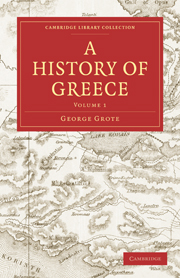
A History of Greece
-
- Published online:
- 05 July 2011
- Print publication:
- 01 April 2010
- First published in:
- 1846
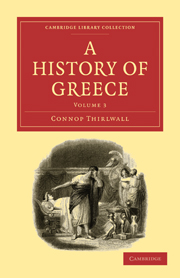
A History of Greece
-
- Published online:
- 05 July 2011
- Print publication:
- 27 May 2010
- First published in:
- 1836
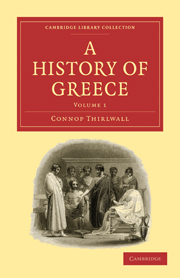
A History of Greece
-
- Published online:
- 05 July 2011
- Print publication:
- 27 May 2010
- First published in:
- 1835
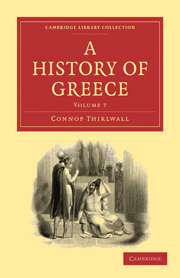
A History of Greece
-
- Published online:
- 05 July 2011
- Print publication:
- 27 May 2010
- First published in:
- 1840
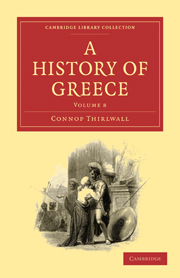
A History of Greece
-
- Published online:
- 05 July 2011
- Print publication:
- 27 May 2010
- First published in:
- 1844
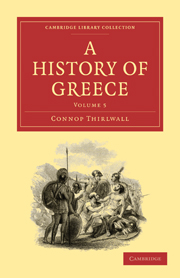
A History of Greece
-
- Published online:
- 05 July 2011
- Print publication:
- 27 May 2010
- First published in:
- 1838
